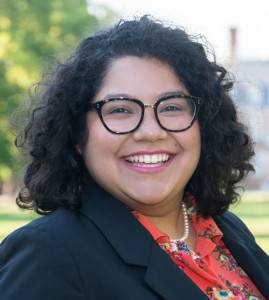 By Alyssa Aldape
By Alyssa Aldape
2015 BJC Fellow
How often have you heard or read Micah 6:1-8 during missions emphasis week at church or school? We use it as the anthem for foreign missions or the local mission trip, but these words from the Hebrew Bible stuck with me during my time at Colonial Williamsburg during the BJC Fellows Seminar. In the passage, God is upset with Israelites because they’ve become numb to the injustices around them. They’re good with making a sacrifice at temple and calling it a day. But God doesn’t let them off so easy. God tells them to remember the times when they were the downtrodden. When they were the minority. Baptists today seem to have forgotten their early beginnings in the United States. I thought of our early Baptist history as a group that was often thrown into jail because they preached without a document or refused to pay a tax to the Church of England. It seems that Baptists in our modern context have forgotten those stories. We’ve lost that fervor and narrative. We’ve forgotten that Baptist ministers like John Leland fought with great conviction to ensure that our Constitution protected religious freedom. This is a part of the Baptist narrative I think we should not be silent about! We ought to be proud of our early Baptist history. The BJC Fellows Seminar was a time for me to remember that history, and lean into my rich identity as a Baptist minister.
The most important reminder for me was the need for education about religious liberty. In seminary, I learned about how important it was to avoid proof-texting Scripture. That is, we cannot pick and choose the passages of Scripture that fit what we’re trying to prove. Just like with building a theological case, we pick and choose quotes from the Framers and use them to proclaim the United States was founded as a Christian nation. Religious liberty has been hijacked and used to mean “religious liberty just for Protestants.” This version of “religious liberty” is usually tied to the claim that the United States was founded as a Christian nation. However, with a basic history lesson, one will learn that although the Framers believed in God, they guaranteed that the established government would not support a state religion. Nor did they think that any politician should have to prove their religious belief. As advocates of religious liberty, we hold in tension our religious conviction and belief in God and the need for keeping religion out of our government. Language plays a key role in this regard.
During BJC Executive Director Brent Walker’s lecture, we discussed the importance of language and the difference between tolerance and liberty. We ought not to be a people of tolerance. Tolerance implies that one side allows another to exist. According former BJC leader James Dunn, if people made in the image of God do not have the freedom to say “no” to religion, their “yes” is meaningless. One faith group should not be in charge of whether or not another exists. During our time at Colonial Williamsburg, we had the opportunity to hear the stories of 18th Century Baptist minister Gowan Pamphlet and Framer Thomas Jefferson, and we were given a glimpse of the life of pioneers of religious liberty.
While I value those encounters and the lectures given by brilliant lawyers and ministers, I learned from the other BJC Fellows in the program. There is the need for cross-cultural relationships in the religious liberty arena. We need each other to gain a more inclusive perspective on what religious liberty can be. I look forward to ongoing conversations with them and living in that tension between church and state as we go on this year-long journey together. I hope to take all the information I learned at the seminar and incorporate it in Sunday school lessons that make sense for youth. I want them to understand that they were born with the freedom to worship or not worship God. In return, they need to respect that freedom given to their fellow sister or brother who is also made in the image of God and, in doing so, remember together God’s goodness and the good work of early Baptists.
Read other reflections from BJC Fellows and visit BJConline.org/Fellows for more on the program.




